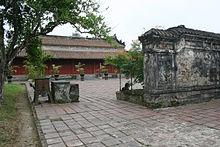Dục Đức
| Dục Đức |
|||||||||
|---|---|---|---|---|---|---|---|---|---|
| Emperor of Đại Nam | |||||||||

Tomb of Đức Dục in Huế
|
|||||||||
| Emperor of the Nguyen Dynasty | |||||||||
| Reign | 20–23 July 1883 | ||||||||
| Predecessor | Tự Đức | ||||||||
| Successor | Hiệp Hòa | ||||||||
| Born | 23 February 1852 | ||||||||
| Died | 6 October 1883 (aged 31) | ||||||||
| Spouse | Empress Từ Minh | ||||||||
| Issue | Nguyễn Phúc Bửu Lân, Emperor Thành Thái | ||||||||
|
|||||||||
| House | Nguyễn Dynasty | ||||||||
| Father | Nguyễn Phúc Hồng Y, Prince of Thoại Thái | ||||||||
| Mother | Trần Thị Nga | ||||||||
| Posthumous name | |
|---|---|
|
Huệ Hoàng đế 惠皇帝 |
|
| Temple name | |
| Cung Tông (恭宗) |
Dục Đức (Hán tự: 育德, IPA: [zùkp ɗɨ́kp]; born Nguyễn Phúc Ưng Ái (1852 – October 6, 1883), was Emperor of Vietnam for three days, from 20–23 July 1883. He was the fifth emperor of the Nguyễn dynasty and father of Emperor Thành Thái, who ruled from 1889 to 1907.
Dục Đức was born Nguyễn Phúc Ưng Ái and at age 17 was renamed Nguyễn Phúc Ưng Chân (). He was the second son of Nguyễn Phúc Hồng Y, the fourth brother of Emperor Tự Đức. He and his two cousins, Chanh Mong (later Emperor Đồng Khánh) and Duong Thien (Kiến Phúc), sons of Tự Đức's twenty-sixth brother Thien Thai Vuong, were adopted by the emperor, who had no children of his own.
After Tự Đức's death, his three regents, Nguyễn Văn Tường, Tôn Thất Thuyết and Tran Tien Thanh, declared the thirty-one-year-old Dục Đức would succeed him. This move was evidently controversial. Historian Pham Van Son and others write that Tự Đức had determined Dục Đức too decadent to rule, and amended his will to name Kiến Phúc as his successor instead. However, the Tam Cung, an alliance of powerful palace women, favored Dục Đức, and convinced the regents to alter the will and appoint him Emperor.
Dục Đức ruled for only three days before he was deposed and sentenced to death by the same regents who had enthroned him. The reasons are unclear. Pham Van Son wrote that Dục Đức so embarrassed the court with his debauchery at the coronation that Tôn Thất Thuyết revealed the incriminating sections of Tự Đức's will. The court quickly ruled to execute him with poison for violating the mourning rules and buried him in an unmarked grave, a notably disproportionate sentence. Other contemporary historians make no mention of this episode and say that Dục Đức was not executed but rather was left to die in captivity, a likelier sequence of events considering that he lived for another three months. The true motivation for the overthrow may have been political; the regents may have feared Dục Đức would strip them of the power they enjoyed under the weak Tự Đức.
...
Wikipedia
